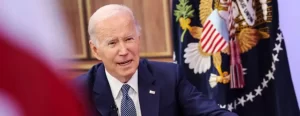

US President, Joe Biden has assures Nigeria’s new president, Bola Tinubu, of his commitment to working with him to strengthen the relationship between the two countries. Biden desire to support economic growth, advance security, and promote respect for human rights in Nigeria. Bola is a Nigerian politician who is the 16th and current president of Nigeria. He was the governor of Lagos State from 1999 to 2007 and senator for Lagos West in the Third Republic. He played a key role in the formation of the All Progressives Congress in 2013.
CHECK: Why More Nigerians Prefer Self-Employment
Nigeria is an important partner of the United States in Africa. The two countries have a long history of diplomatic relations. The United States’ diplomatic relationship with Nigeria dates back to 1960. This follows Nigeria’s independence from the United Kingdom. It engages in intensive efforts to defeat terrorist organizations within its borders, including Boko Haram and ISIS-West Africa (ISIS-WA). The Country is a vital member of the Defeat ISIS (D-ISIS) coalition.
Biden’s foreign policy emphasizes repairing the U.S.’s alliances. He says these alliances were damaged under the Trump administration. Also, He is working on returning the U.S. to a “position of trusted leadership” among world democracies to counter challenges from Russia and China. Biden and his team continue the policies of previous Republican administrations on issues that have bipartisan consensus, particularly competition with China and shrinking U.S. military presence in the Greater Middle East.
CHECK: Banks lift suspension of international transactions on naira cards
Table of Contents
Economic growth plans of President tinubu’s government
President Tinubu has vowed to expand Nigeria’s economy by at least 6% a year. Lift barriers to investment, create jobs, and unify the exchange rate. Tinubu has also promised to diversify the economy by expanding agriculture and other non-oil sectors. To achieve his economic objectives, Tinubu plans to institute budgetary reforms that stimulate the economy without engendering inflation. He also plans to increase crude oil production to 2.6 million barrels per day by 2027. 4 million barrels per day by 2030 to boost the nation’s revenue. Economists are already predicting that Tinubu is expected to devalue the naira by as much as 15% to help stabilize the economy. Tinubu has also unveiled a plan to harmonize the nation’s multiple exchange rates as part of the broad plan to transform Africa’s largest economy. Tinubu has assured stakeholders of a private sector-driven economy if elected president and has promised to address fiscal, monetary, and trade reforms to increase domestic production, curb imported inflation, and ensure better macro-economic stability. Tinubu has also pledged to review complaints by both local and foreign investors on multiple taxations and various anti-investment inhibitions.
The current state of Nigeria’s economy and what challenges President Tinubu face in achieving his economic growth plans
As of May 2023, Nigeria’s economy is facing several challenges. This includes anemic economic growth, record debt, and shrinking oil output.
The Nigerian President who took office on May 29, 2023, has inherited these issues and will need to secure public support for potentially painful decisions to address them. Also, Nigeria’s GDP per capita stands at $2,326 (nominal) and $5,884 (PPP) as of 2022. The economy is projected to grow by an average of 2.9% per year between 2023 and 2025, only slightly above the estimated population growth rate of 2.4%.
CHECK: Meta Lowers Age for VR Headset to 10 Years Olds
Some of the key challenges President Tinubu faces in achieving his economic growth plans include:
Increasing tax collection: This is crucial for Tinubu’s administration, as revenue troubles stem from rampant industrial-scale theft, which has pressed oil output to its lowest in more than 30 years. Oil and gas typically fund half of Nigeria’s budget and 90% of its foreign exchange.
Cutting fuel subsidies: This controversial decision could have a significant impact on the economy. Fuel subsidies cost Nigeria almost $10 billion in 2022, and cutting them could free up funds for other sectors, such as education and healthcare for low-income households.
Reducing poverty and unemployment: More than a third of Nigeria’s population is currently unemployed, and citizens expect Tinubu to create jobs, fix the free-falling economy, and tighten security. As of 2022, Nigeria’s unemployment rate stands at 33%.Addressing inflation: Nigeria’s inflation rate increased to 21% in 2022, compared to an average of 10.6% for emerging and developing economies. In March 2023, inflation reached a multi-year high of 22%.
Dealing with insecurity: Tinubu’s ambitious plans could be threatened by challenges such as insecurity, fiscal crisis, poverty, and deepening public discontent with the state.
You May Like:









